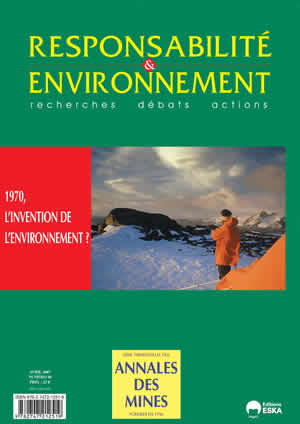|
 N° 46 - avril 2007 -
1970, l'invention de l'environnement ? N° 46 - avril 2007 -
1970, l'invention de l'environnement ?
Les agences de l'eau et le contexte de la régionalisation
par Bernard Barraqué
Directeur de recherche, CNRS, Latts
Crées à l'époque de la Datar, celle de l'aménagement du territoire et des grands projets gaulliens mais aussi quand le mouvement gaullien commence à se confronter à l'épaisseur du « local », les Agences de l'eau, entre modernisation et respect de l'identité régionale sont typiques de cette montée de l'institutionnalisation de l'action collective. Souvent mises en cause pour leur inefficacité elles n'ont jamais eu vocation à remplacer la régulation étatique de type traditionnel par une régulation de type économique, mais de faciliter le respect des règles nouvelles d'environnement. Dans un monde moderne et mondialisé, la légitimité de l'action publique n'est-elle pas liée aussi à l'efficacité de l'action ? Régions et organismes de bassin ne doivent-ils pas jouer un rôle accru ? Une loi récente tend à « recentraliser » la politique de l'eau. Fallait-il le faire ou, au contraire, jouer sur plus de démocratie participative ?
 Télécharger gratuitement l'article Télécharger gratuitement l'article
 Retour au sommaire Retour au sommaire
 N° 46 - april 2007 - 1970, the invention of the environment? N° 46 - april 2007 - 1970, the invention of the environment?
Subsidiarity: upwards or downwards? The origin of French water agencies and their place during a period of regionalization
Bernard Barraqué
Water agencies were created at the time of DATAR for the development of regional planning and the management of big projects during de Gaulle’s presidency — at a time when the Gaullist movement was caught up in the thick of local politics. Given their position between modernization and regional identities, these agencies were clearly evidence of the increasing institutionalization of collective actions. Though often criticized for their lack of efficiency, they never had the assignment of replacing traditional government regulations with an economic sort of regulation. They were intended to facilitate compliance with new environmental standards. In a modern, global world, does the legitimacy of public interventions not depend on their effectiveness? Should regions and river valley authorities not play a larger part? Is it a good idea to “recentralize” water policy, as a recent law tends to do. Or on the contrary, should more place be made for participatory democracy?
 Retour au sommaire Retour au sommaire
|



